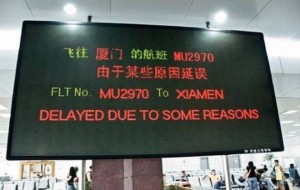Everybody Lies
May 28, 2013
Marketing claims of universal expertise by freelance translators and “We Do Everything” agencies damage industry credibility and drive the commodity mentality
A handyman knocks on your front door.
“I can fix anything,” he announces when you answer.
“Well, my roof leaks,” you reply,” and I was thinking of getting some estimates —
“—I am the best at roofs!” he says, interrupting you. “Better than those roofing companies that rip you off.”
“OK, but sorry, I can’t talk right now,” you say, trying to be polite. “I need to take my daughter’s computer in to have it looked at and—“
“Computers! Yes! I can do that! I built a desktop from scratch once and everybody loves my computer work. Never had a complaint.”
At this point you stop, cross your arms and frown with suspicion.
“Can you surgically insert a catheter and stent into my carotid artery before noon?” you ask sarcastically.
“Of course! And at a great price!” he insists.
I’ve had this exact same conversation with freelance translator job applicants for well over 25 years. At the end of their frantic song-and-dance sales pitches, I feel as confident about their abilities as I do about the skills of the do-it-all handyman with the stratospheric overconfidence.
This is one of the many steep prices we pay for the zero-barrier-to-entry field of professional translation. Anybody can claim to be a “professional translator.” And a very large number of anybodies do.
Agency Offenders
Many translation agencies are even more guilty of these kinds of overreaching, handyman-class absurdities because they not only claim expertise in all subjects but also in “all languages,” a combination that is mathematically impossible. Expansive claims of language expertise on their websites list non-existent languages in text overrun with blatant grammatical errors and obvious misspellings as well as bizarre contradictions (“We are experts in transesophageal echocardiography….and we also do all subjects and languages!”)
Excruciating amateurishness
This kind of excruciating amateurishness severely undercuts our authority as language experts with customers and the public. And the commodity sector of the translation industry itself – beset with plunging chasms of insecurity and fretfulness driven by fears of ever-decreasing prices – desperately needs a professionalism makeover of the very highest order.
10,000 Hours
It’s important to recognize above all that true mastery in language – and especially subject-matter expertise – requires brutal, hard work, measured in decades, and not the five minutes it takes to print “expert” on a business card. In fact, true world-class expertise and professionalism as a translator requires 10,000 hours of focused practice under skilled supervision with consistent expert feedback.
Malcolm Gladwell’s 2008 book Outliers popularized this 10,000 hours figure, which in turn was based on human psychological and psychometric research originally conducted by Anders Ericsson. It dethroned a whole host of myths about expertise and talent:
“The striking thing about Ericsson’s study is that he and his colleagues couldn’t find any “naturals,” musicians who floated effortlessly to the top while practicing a fraction of the time their peers did. Nor could they find any “grinds,” people who worked harder than everybody else, yet just didn’t have what it takes to break the top ranks.
Their research suggests that once a musician has enough ability to get into a top music school, the thing that distinguishes one performer from another is how hard he or she works.
That’s it.
And what’s more, the people at the very top don’t just work harder or even much harder than everybody else. They work much, much harder.”
The neurologist Daniel Levitin has also found that 10,000 hours of practice is required to achieve the level of mastery associated with being a world-class expert – in anything. Whether it is concert pianists, ice skaters, chess players, fiction writers, or computer programmers – no one has yet found a case in which true world-class expertise was accomplished in less time.”
As Gladwell noted in his book, “Ten thousand hours is an enormous amount of time. It’s all but impossible to reach that number all by yourself by the time you’re a young adult.”
Expertise in the Translation Industry
What first jumps out at language professionals from this research – aside from the refreshing scientific explanation of the universal absence of “young adult experts” anywhere in the language industry – is how convincingly it simultaneously dismantles the plague of claims of expertise based on “a natural talent for languages” or “long residence in foreign countries” or a “passion for things foreign” or “training in the most sophisticated Spanish in Latin America” (seriously?) and other specious silliness that pops up all over translators’ resumes. The point it drives home is this – there are no short-cuts, least of all those that are accidents of birth or circumstance or personal imagination.
And proximity to mastery – the expertise claimed on all those websites – requires that professional translators be very far along that 10,000-hour timeline.
Keys to success
Sadly, a significant number of working translators – not just beginners, but more than a few intermediate and even advanced ones, who have worked for longer than 10,000 hours, but alone and without editorial oversight, so they make the same mistakes over and over – have made the grave error of failing to develop true subject-matter expertise along that same 10,000-hour trajectory. Subject-matter expertise is not only the principal quality differentiator on the market, it’s the single best way to stand out from the competition. It opens the door to the high-end specialist and “value-added” language services companies as well as the direct client market.
So this failure is a terrible trap because translators without true subject expertise or editorial feedback are implicitly encouraged to maintain these appallingly bad habits by “We Do Everything” agencies that – contrary to what they tell their customers – do not edit or revise translators’ work, add value or provide feedback of any kind. It’s all about price. This is a toxic form of co-dependency that robs translators of their very ability to learn and improve.
Be careful what you ask for…..
An inevitable consequence of “We Do Everything” marketing so prevalent in the commodity sector of the translation industry is that it leads customers to the conclusion that “doing everything” is easy. It requires no special expertise because no special expertise is claimed by the providers. So translators and agencies in this sector are left to fight over market share for what they themselves portray as an indistinguishable product, which by definition makes it a commodity.
And the race to the bottom on price is underway.
Choosing markets
The one island of stability and sanity in the catastrophic cost-cutting, job-destroying, price-driven apocalypse of modern journalism is The Wall Street Journal.
The Wall Street Journal not only charges hundreds of dollars a year for their newspaper, they charge for access to their website.
The Wall Street Journal has always charged for access to its website.
There is a lesson here for the translation industry. Marketing to people with money who will pay for access to quality information – and where the cost of failure is extremely high – will always be a winning strategy. And even today this is true in the translation industry, where the high-end subject-matter-expert sector of the market continues to expand – and demand is strong – even as the pricing fistfights and free-falling rates are the prevailing reality below.
The Wall Street Journal does not “do everything.” But what they do, they do very, very well.






Great post! Love your clear and incisive style.
Just wanted to point out:
is
nowhow hard he or she worksthat robs
translators’translators of their very ability to learn and improveFrom a hard-working translator
Yes, thanks, all fixed! “Nobody reads your text more carefully than a translator.” 🙂
This is a great post. However, I have to disagree with you slightly. In my opinion, the truth is that many of these so-called translators who claim to be able to translate everything, actually believe that what they are saying is true – therefore rather than being liars as such, they’re basically just ignorant.
And I feel I can say this, because I used to be one of them. The root of the problem is a lack of education at all levels. When I graduated in French and Italian from one of the world’s leading universities, I felt I was automatically qualified to translate anything. And why wouldn’t I? I had never been told anything to the contrary. Translation classes at university were filled with the theory of translation, but studiously ignored the most important aspect of translation – i.e. specialization. My first in-house translation job was for a software house producing solutions for financial institutions. It was only when a real subject-matter expert explained to me that my translations were absolute jibberish that I started to understand the true complexities of translation. So what I’m saying is that until people are made aware of their own limitations, how can we possibly expect others to grasp the difficulties of translation?
Stella, I agree that many translation programs do a terrible job of managing their students’ expectations, not only about the nature of the translation market, but about the suitability of their students’ skill sets. It’s something that usually falls to the professional associations, mentors, colleagues and, unfortunately, unwitting customers. You were honestly lucky to be set straight while you were in-house. It’s where a lot of good people start the long march up the mountain.
If everyone lies, Malcom Gladwell does too. That guy is the master bullshitter in fact. While that, 10,000 hour coup d’œil seems proof of competence, but is still inadequate for good outcome if we are blind to the faults and weakness of individual contributors. Translation is not a solitary sport. Just as WSJ can cover any story, regardless of expertise, a well-run LSP should be able to do the same, if a QA process has been properly implemented . Proof is in the market, where most of us are required to offer a range of services to a range of industries, and most do just fine in provisioning that service.
PS Good stuff, Kevin. Write more!
Hi Ken,
While Gladwell may be a “master bullshitter,” it’s perhaps worth noting that Gladwell just popularized the 10,000 hour figure, he didn’t come up with it himself. It was first identified from extensive psychological research by Anders Ericsson and his colleagues and later in neurological research by Daniel Levitin. Other researchers have built on those results, demonstrating the importance of feedback and collaboration to true expertise.
I agree proof is in the market, although the inevitable next question is “which market?” My own personal experience is that the most rewarding markets — those with spectacular, breathtaking margins — are built around the kind of expertise that only the 10,000-hour people can offer. It sure provides protection from long protracted battles over fractions of a cent on fuzzy matches.
I built ASET around a very simple proposition. What SUBJECTS does the translator master? It drove every single translation hiring decision I ever made. I started with a consulting company billing $250K a year and sold it as a translation services company billing $25 million a year. Worked for me! 🙂
Kevin,
great great topic! Thank you for writing about this and being so clear.
I am not at my 10,000 hour yet and I confess, that in the past I worked for some of these “WDE” agencies. You spit blood for them, you get peanuts and lose your focus, just like you said.
Then I dropped some and replaced them very slooowly with valuable agencies.
Your article helps me to stay on this road, thank you!!
Good to hear! Keep working with the better agencies. And master your subjects!
Excellent post.
The key difference when you know a subject well is being able to “think with” the author – to the point of spotting errors and omissions, and being able to highlight these to the client. And not just errors and omissions of language or style – but concrete errors and omissions relating to necessary content. This is where private clients can be convinced, maintained, and held onto. Similar to Stella, I believe a lot of these “I can everything” translators truly believe they really can translate everything, with the help of enough “research” and checking in dictionaries. It isn’t until they come a cropper one day that they realise this is incorrect, and that to be good at translating within a certain domain, you need to have some genuine interest and perhaps experience in it. I think they simply don’t know the difference between understanding the words and understanding the meaning. They think the confidence you get from understanding the words is all there is.
I was recently told that some autodictats produce fantastic work in my specialisation, IT, and had to disagree. Perhaps they simply were not looking with the same critical eye. I’ve seen the IT translations of one of the best translators I know and these contained some quite basic terminology confusion (“harmonised” or “coordinating” rather than “synchronising”). This person is an absolute marvel at marketing translations, however.
Unrelated to this post, I must say I really enjoy the articles on your blog. Ignore the requests to write more often, I get them too… There are so many mediocre blogs, it is nice to read something substantial, informative and opinionated. I wish I had the guts to be more opinionated on my blog, too. Your blog stands out. It is also very beautifully written. Quality before quantity, after all…
Hi Rose,
Yes, absolutely, on subject-matter expertise. Translation, properly understood, requires that the translator know everything the original writer does. EVERYTHING. This alone should be terrifying to translators. It should stop them dead in their tracks. This mystical, almost eager, willingness to jump into unfamiliar territory armed solely with random lists of words (dictionaries) is akin to jumping into the middle of the South Pacific armed with nothing but a snorkel.
This is why there are so many exhausted and bloated bodies piled up on the shores of the commercial translation market. I cut my teeth in the scientific publication market and spent a good deal of my adult life in collaborative translation with true subject experts (and being edited within a millimeter of my life), only later to be simply stunned by how casual many commercial translators are when it comes to subject-matter expertise. Experienced translators — famous ones, even — seem to believe that once they master the “terminology,” the battle is finished.
In reality, the battle hasn’t even begun yet. Terminology tricks as much as it reveals.
And how can I say thank you enough for your final paragraph? That was kind beyond words. The only promotion this site gets is through word of mouth, so your comments are especially gratifying in that respect. 🙂
Excellent blog, right to the heart of the matter. Much appreciated.